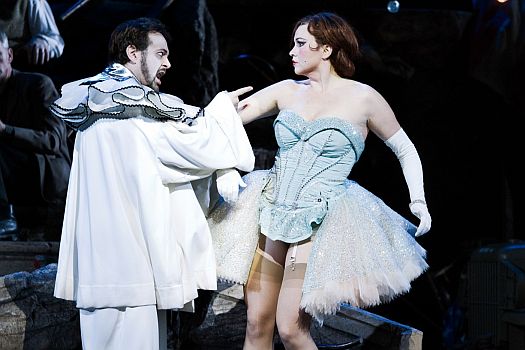 Denmark Mascagni, Cavalleria Rusticana and Leoncavallo, Pagliacci: Stefano Ranzani (conductor), Royal Danish Orchestra and Opera Chorus, The Royal Danish Boys’ Choir, and Gentofte and Jægersporg Church Girl’s Choir, Operaen, Copenhagen, 22.01.2012 (NS)
Denmark Mascagni, Cavalleria Rusticana and Leoncavallo, Pagliacci: Stefano Ranzani (conductor), Royal Danish Orchestra and Opera Chorus, The Royal Danish Boys’ Choir, and Gentofte and Jægersporg Church Girl’s Choir, Operaen, Copenhagen, 22.01.2012 (NS)
Production:
Director: Kasper Holten (Cavalleria Rusticana), Paul Curran (Pagliacci)
Set designer: Mia Stensgaard
Costume designer: Anja Vang Kragh
Lighting designer: Bruno Poet
Casts:
Cavalleria Rusticana:
Santuzza: Iréne Theorin
Turiddu: Roy Cornelius Smith
Lucia: Johanne Bock
Alfio: Fredrik Zetterström
Lola: Hanne Fischer
Pagliacci:
Canio: Roy Cornelius Smith
Nedda: Sine Bundgaard
Tonio: Fredrik Zetterström
Beppo: Michael Kristensen
Silvio: Palle Knudsen

The classic double bill of Cavalleria rusticana and Pagliacci used to be a frequent fixture at the Royal Danish Opera, but this new production is the first time either opera has been performed in Copenhagen since 1984. Fortunately, it was worth waiting for.
The two directors made good use of the same basic setting: a wide staircase dominating the stage leading up to a church door. In Cavalleria all the action takes place here, often under the judgemental eyes of the villagers. Mr Holten chooses to emphasise Santuzza’s position as an outcast, with the chorus demonstrating their rejection of her by gesture and even spitting. The most daring and most gripping directorial decision was to have Alfio and Turiddu duel onstage: they are hidden by a compact crowd, which Lucia tries and fails to push through when she realises what is happening.
The end of Cavalleria was also the best part in musical terms. In the first half, the orchestra and chorus sometimes drifted apart (though the singing was very good). Mr Ranzani’s tempo changes were presumably the problem, as they were a bit too extensive, for example in Alfio’s first aria. Roy Cornelius Smith’s Turiddu had an attractive voice but seemed initially unable to sing at anything less than forte. But he shook this off and widened his dynamic range to excellent effect in his very moving farewell to his mother Lucia. Santuzza (Iréne Theorin) was compelling in both her acting and her singing throughout, expressive over her entire range. Alfio (Fredrik Zetterström) also sang expressively but was rather overpowered by Santuzza. Add a moving and sympathetic portrayal of Lucia by Johanne Bock and a chorus on terrific form for “Vivo, il vino spumeggiante” and the whole final scene was gripping.
Paul Curran put the clock forward a few decades, setting Pagliacci in the same village just after its liberation by American forces after the Second World War. The bombed-out church square hosts a commedia dell’arte troupe brought in by the US Army to provide the local population with some much needed comic relief.
Tonio (Fredrik Zetterström) immediately set a sombre note in the Prologue, singing movingly despite a little trouble reaching his top notes. His portrayal of Tonio was at first sympathetic – a humpbacked man who is ignored by the woman he loves and cursed to be the butt of many onstage jokes as Taddeo. But he became a sinister and vengeful figure after Nedda’s rejection of his violent advances.
Sine Bundgaard was a captivating Nedda, with a light and lyrical voice. She acted and sang expressively in all situations, whether the dramatic confrontations with Canio or her tender duet with Silvio (Palle Knudsen, who also sang beautifully). Her attempts to keep playing the role of Colombina, aided by Michael Kristensen’s delightful Beppo/Harlequin, in Act 2 despite Canio’s rage were deeply touching.
Roy Cornelius Smith was also fantastic as Canio, portraying him as flamboyant but insecure. He clearly has strong feelings for Nedda but seems unable to express them in any other way but jealousy (no wonder she was unfaithful to him). It is the genuineness of his love for Nedda that saves him from being a totally unsympathetic character, and lends real expression to “Vesti la giubba”. His singing was top-notch throughout (no volume problems this time).
The chorus had less to sing than in Cavalleria, but where they did sing they were musical and lively (the children especially). Various members of the chorus also had important silent roles as pairs of lovers having trysts in the background as Nedda and Silvio sing about their love, and Tonio and Canio creep closer. Their reactions in Act 2 were perfectly judged and helped to make it gripping to the last bar.
Niklas Smith